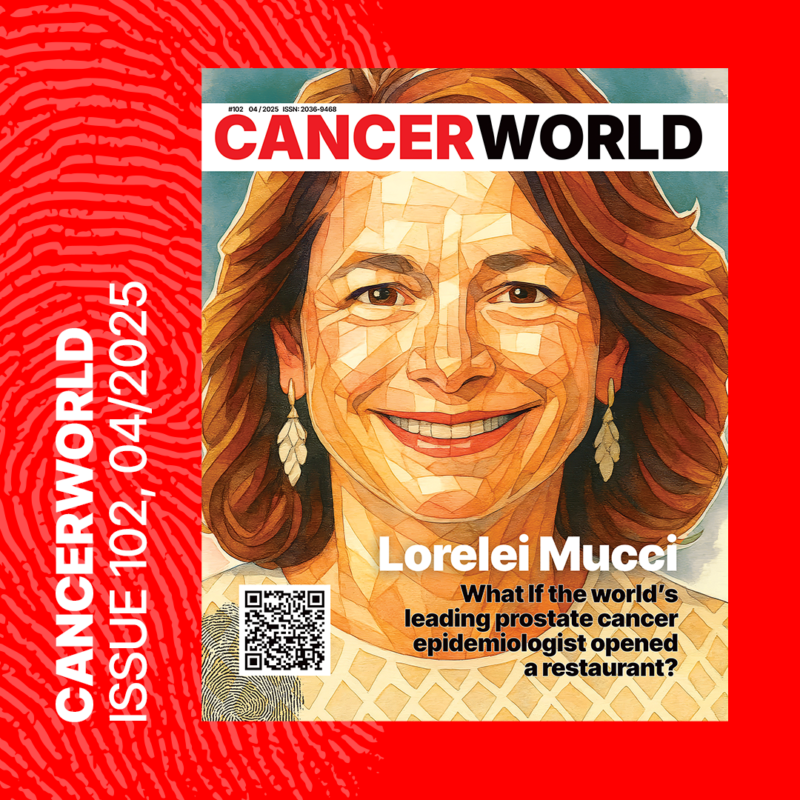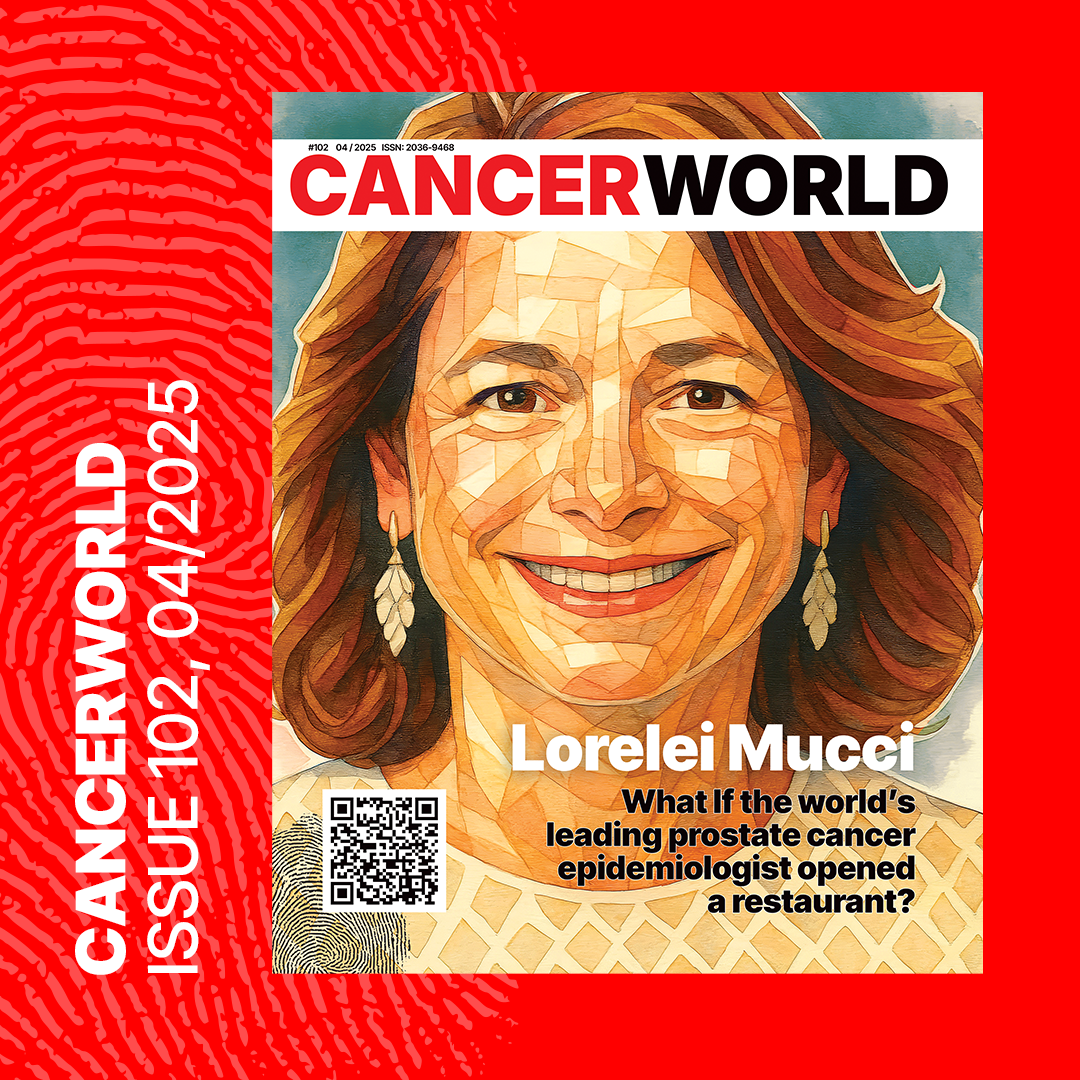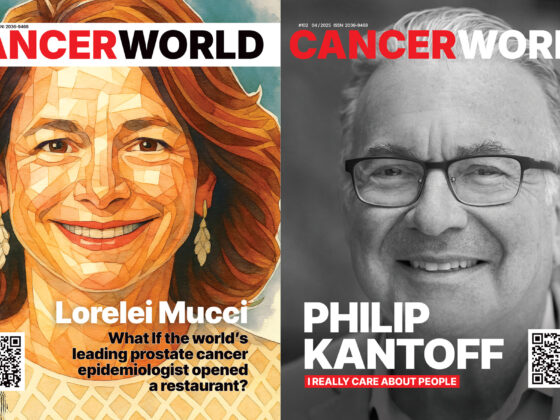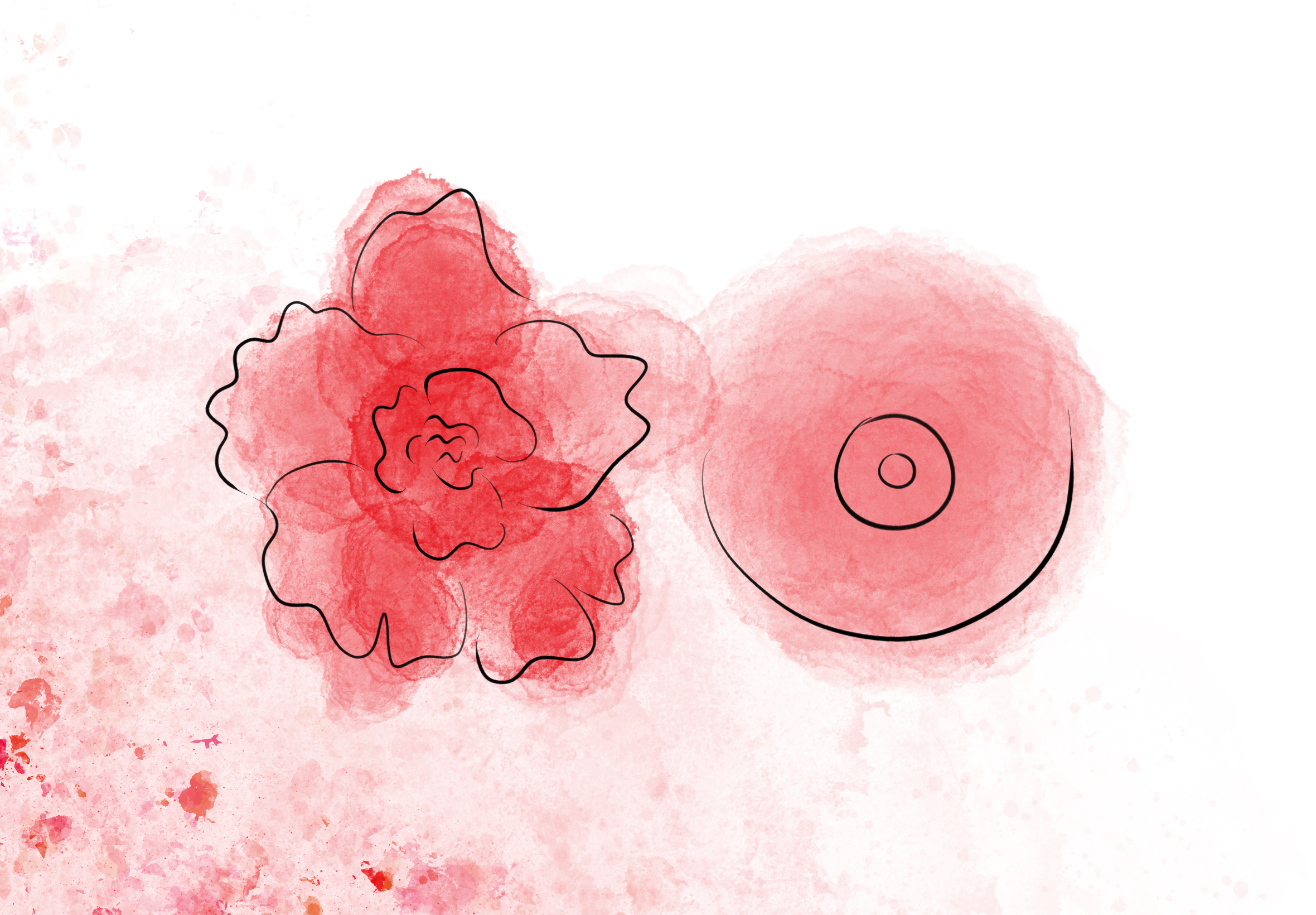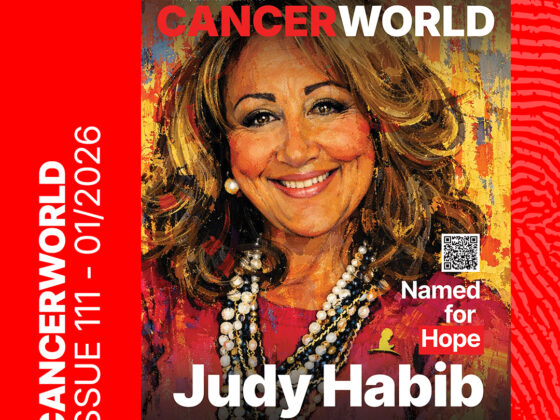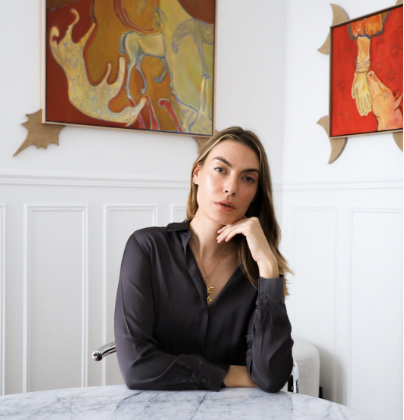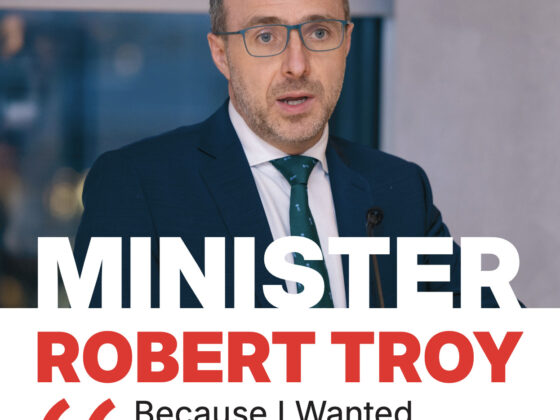I always close my interviews with a signature question: “Who should I speak with next?”
It’s a small but revealing moment — a window into whom the giants of oncology admire, learn from, and find truly compelling.
When I posed the question to Dr. Philip Kantoff, his answer came without hesitation:
“My wife, Lorelei Mucci.”
It wasn’t just a nod to her professional accomplishments — it was a heartfelt sign of the deep respect she’s earned, especially among those who’ve spent their lives in this field.
And the next day, we were sitting for an interview by the glass windows, with Boston’s busy routine unfolding outside.
From Wyoming to Harvard: Being open to chance and taking different paths
Dr. Lorelei Mucci’s career has been marked by unexpected turns, moments of serendipity, and an openness to opportunity. It all began with a genuine interest towards science but something was missing.
“I loved science, but lab work felt kind of lonely,” she admits.
Wyoming changed everything.
“I moved out to Wyoming for a year and a half and worked for a pathologist who covered all of Western Wyoming. And that was fascinating to learn about rural health care and the challenges. He diagnosed everything from cancer to malaria. But I think it got me interested in thinking about science from more the public health perspective,” she recalls.
This unexpected detour led her to pursue a career in epidemiology, a field she had never heard of before. After applying to the Harvard School of Public Health, she quickly immersed herself in her doctoral training, which became the launchpad for everything that followed.
“I had a chance to meet somebody who completely changed my life. His name was Dimitrios Trichopoulos and he was a really world-famous cancer epidemiologist. It was his excitement and passion for cancer that truly sparked my own interest in the field. In many ways, I believe my career and life have been shaped by serendipity—by being open to chance and willing to take different paths.”
Sweden: The paradise for epidemiologists
Her career then led her to a postdoctoral fellowship at the Karolinska Institute in Sweden, which Dr. Mucci describes as a “paradise for epidemiologists.”
“Sweden has national health registers that track every aspect of people’s health, which is incredibly valuable for epidemiological research,” she explains.
Dr. Mucci worked with the country’s famous twin registries.
“It was a completely unique resource. To be able to identify a cohort of 200,000 twins followed for 40 or 50 or more years for cancer mortality and be able to really dive deeply into the heritability of cancer was really exciting,”—an experience that would shape her future research.
What do I want to do that’s really different?
When asked what’s next in her distinguished career, Dr. Lorelei Mucci reflects thoughtfully.
“I think asking that question is really something I’ve also been thinking about for myself: what do I want to do that’s really different?” she muses.
Two years ago, she took on a part-time role at the American Cancer Society as a senior scientific advisor.
“I’ve been doing some things that are really different, really exciting,” she says.
One such initiative was her involvement with a collaboration between American Cancer Society, the Prostate Cancer Clinical Trials Consortium, and an organization called Trial Library. Together, they developed a program aimed at addressing the lack of diversity in clinical trials for prostate cancer.
“Black men are at much higher risk of prostate cancer, much more likely to die from it, but they represent less than 5% of clinical trial participants,” Dr. Mucci explains.
This disparity led her to work on solutions to engage communities and provide them with the resources needed to participate in clinical trials. “It’s very different from the traditional epidemiology research.”
Exploring Environmental Impacts on Cancer Survival
Beyond prostate cancer, Dr. Mucci is also exploring new areas of research focused on the environment’s impact on cancer survival.
“I’ve become very interested in how things like wildfires, smoke, or floods may impact cancer care, screening, and survival. These environmental factors could also expose individuals to heavy metals or carcinogens, which have long-term consequences on health. What are the long-term consequences of exposure to these factors? How can we study that? How do we assess biomarkers and measure environmental influences in the communities people live in?”
Another exciting avenue Dr. Mucci is exploring involves the link between diet, health, and cancer outcomes.
“I’m starting to delve into the idea of how diet can impact health, but also how it can positively influence the environment. A colleague of mine, Walter Willett, developed the Planetary Health Diet Index, a plant forward dietary pattern that also is beneficial for the planet’s health. I am working on a funded study examine this dietary pattern to prostate cancer incidence and outcomes in cancer patients,” she says.
Why Prostate Cancer? Addressing a Big Unmet Need
When asked why she chose to focus on prostate cancer, Dr. Lorelei Mucci traces the origins of her decision to a bit of serendipity.
“It was an opportunity that came up when I returned from Karolinska,” she explains. “I joined colleagues at Brigham and Women’s Hospital, and I got involved in some funded research. I didn’t know much about prostate cancer back then,” she admits. “But what struck me was how little epidemiology had been done on it compared to other cancers like breast or colorectal cancer.”
She quickly realized that prostate cancer was a significant health issue.
“Prostate cancer is the leading cause of cancer among men in over 100 countries. It’s a huge burden, and there was so much work to be done in terms of screening, prevention, and treatment,” she says.
Prostate cancer research has come a long way, but many of the treatments were introduced before we fully understood how to use them in the best combinations or sequences — not just to improve survival but also quality of life.
“In the last ten years, there’s been an explosion of new therapies for metastatic prostate cancer,” she notes. At the same time, we were learning more about the biology of metastatic prostate cancer,” she continues. “There was a big unmet need for research that could guide treatment options.”
While clinical studies on prostate cancer were being conducted at single institutions, they didn’t cover all aspects of survivorship. That’s why the IRONMAN registry, a global initiative collecting real-world data from men with advanced prostate cancer, was created.
“We needed to develop a global cohort to understand the real unmet needs in advanced prostate cancer. This is why the IRONMAN cohort was designed to span 15 countries worldwide, addressing gaps in global prostate cancer research, particularly in underserved regions like Africa and the Caribbean, where prostate cancer mortality rates are alarmingly high,” she explains.
According to Dr. Mucci, the research in these populations has been minimal.
“We’re enrolling patients from countries where prostate cancer mortality rates are enormous, and little research has been done to address these disparities.”
Rising Prostate Cancer Rates in the U.S.
Dr. Mucci also highlights an alarming trend in the U.S. regarding prostate cancer.
“With the decline in prostate cancer screening in recent years, we’re seeing an increase in newly diagnosed metastatic prostate cancer,” she explains. “As a result, the number of deaths from prostate cancer is also rising.”
The IRONMAN cohort is crucial not only for studying metastatic prostate cancer.
“We need to study both populations—those who progress to metastatic cancer and those diagnosed with de novo metastatic disease,” she says.
“IRONMAN is a collaborative project, of epidemiologists, clinicians, molecular biologists, and patient advocates. I am co-leading this with my husband Phil, as well Daniel George, a medical oncologist at Duke. Dan is a fantastic person and physician-scientist.”
Being the best mother or the best researcher?
Dr. Mucci’s journey was marked by both personal and professional challenges.
“I’ve been very fortunate to have fantastic mentors who have helped me navigate through some of the toughest moments,” she begins.
However, a particular hurdle weighed on her more than any other.
“As an early investigator, there was always the challenge of funding and getting established in the field,” she says. “But on a personal level, I think the biggest challenge was how to balance being a mom with being a successful scientist and academic leader. How do you manage those two things?”
She continues, “I think I did a good job. Hopefully, my son would say that.”
Yet, she acknowledges that no matter how hard she tried, she never felt like she was excelling at both roles.
“You’re always giving and taking along the way,” she reflects. “You never feel like you’re being the best mother or the best researcher.”
We’re being told that we shouldn’t study women’s health or LGBTQ+ health
Despite being a globally recognized professional, Dr. Mucci still faces challenges, and she openly shares some of the recent ones she has encountered.
“The last two months have been some of the most difficult in my career,” she admits. “It’s so frightening to see what’s happening to science, particularly with the growing attacks on public health.”
She points out the mounting pressure on various aspects of science and research.
“We’re being told that we shouldn’t study women’s health or LGBTQ+ health,” she says. “It’s deeply troubling for the future of research.”
Her concern extends beyond her own career. “For young investigators, students, postdocs, and junior faculty members, I worry about the future of their careers and funding,” she shares. “It’s a scary time for them, and it’s terrible times for the field overall.”
A Legacy of Guidance: The Mentors Who Shaped My Career
Dr. Mucci’s career has been shaped by numerous influential mentors, each of whom has left a lasting impact on her personal and professional development.
“Phil was one of the colleagues who had a big influence on me,” she notes, recalling her connection to her husband Philip Kantoff, who played a pivotal role in her transition to prostate cancer research.
Dr. Mucci explains how she first worked with epidemiologist Meir Stampfer, who connected her with Phil. “As a PhD scientist, if you want to work in prostate cancer, you really need to understand the clinical issues,” Stampfer advised. This connection helped Dr. Mucci build a bridge between her research and clinical applications.
Alongside Phil, Dr. Mucci worked closely with pathologist Massimo Loda at Dana Farber and then Weill Cornell, a key mentor who influenced her research in tumor-based biomarkers. “He’s a fantastic individual, and I gained a lot of mentorship from him,” she shares.
She also highlights Edward Giovannucci, a forward-thinking nutritional cancer epidemiologist.
“He would be a fascinating person to work with,” Dr. Mucci says, admiring Giovannucci’s innovative approach to the field.
Another influential figure in her journey was earlier mentioned Dimitrios Trichopoulos, Dr. Mucci’s doctoral mentor. “He always challenged us to not be afraid in our hypotheses,” she recalls. “He encouraged us to be bold, take risks, and it’s okay to fail.”
Despite her accomplished career, Dr. Mucci acknowledges the ongoing importance of mentorship. “As you get older, it’s harder,” she admits. “Mentorship is different now. It’s more about finding colleagues you trust, people with whom you can share your concerns and get constructive feedback.”
Leadership is about providing others with the resources and vision to thrive
Dr. Mucci speaks with pride about her mentees, a team of epidemiologists who have been integral to her work.
“I have this wonderful group of people. They’re all women, and I’ve seen a significant change over the years in how many women have become interested in prostate cancer epidemiology,” she says.
When Dr. Mucci began her career, the field was predominantly male, but the landscape has shifted, reflecting the increasing inclusivity in scientific fields.
In addition to her work with epidemiologists, Dr. Mucci mentors clinical colleagues at Dana-Farber, Brigham and Women’s, and Mass General Brigham.
“I’ve also been fortunate to mentor a number of clinical colleagues who are interested in clinical cancer research,” she shares, emphasizing her broad reach and influence in both epidemiological and clinical spaces.
“I think leadership is providing others with the resources, vision, and opportunities to thrive in an environment. It’s about offering guidance when needed and being an advocate for your team.”
Dr. Mucci describes her leadership style as collaborative and supportive. “I prefer to lead through consensus building rather than a top-down approach,” she explains. She values inclusivity and teamwork, believing that leadership should be about fostering a cooperative environment where everyone can contribute and excel.
Dr. Mucci also serves as the faculty director of the Cancer Epidemiology and Cancer Prevention Program within the Department of Epidemiology at the Harvard T.H. Chan School of Public Health. She explains that each student’s journey is unique.
“Mentorship is about understanding what each person’s goals are. Some students come to gain research experience, some want to learn how to teach, and others are looking to pursue a PhD.”
She advises tailoring the experience to meet each student’s personal goals. “It’s about finding what’s right for each person and helping them along the way.”
Be Bold in Your Ideas and Collaborate Generously
Dr. Mucci has a key advice for those pursuing a career in cancer epidemiology.
“Be bold in your ideas,” she suggests. “The successful cancer epidemiology research I see now involves collaborations with people from diverse fields—clinicians, basic scientists, and more. It’s not just about your own research; it’s about working together with others to make a real impact.”
Then she adds a message that ties it all together:
“Learning how to be a generous and thoughtful collaborator is one of the best things you can do,” she says.
Two Leaders, One Direction
Dr. Mucci shares a humorous yet insightful story about the dynamics of having two leaders in a family.
“Before we were a couple, we were friends and colleagues for such a long time,” she begins. “I think we have a really strong foundation of trust and mutual support.”
Throughout their careers, Dr. Mucci and Dr. Phil Kantoff have collaborated extensively.
“We published, around 80 papers together. We’ve collaborated really successfully. And I think our style of leadership and approach to science is not dissimilar. I think we have similar thoughts about that. But there was a time when we took a kayak out together, a double-person kayak, and I was in the front and he was in the back. But we were both trying to steer the boat.”
These moments are an analogy for the occasional difficulty of having two strong leaders. “It can sometimes be hard to have two people who are both used to leading things,” she admits.
“But I’ve learned so much from Phil about leadership. He’s been a successful leader in so many different environments. The way he navigates people with such diverse personalities is truly fantastic,” she smiles.
If not this, then pasta
When asked what she would pursue if not cancer epidemiology, Dr. Mucci’s answer is as heartfelt as it is unexpected. “I would open a restaurant,” she says with a smile.
“It would be an Italian restaurant. It would be small and quaint, with a beautiful patio for when the weather is nice to sit outside. It would be a place where people could come together, share a meal, and maybe learn to cook as well.”
Dr. Mucci didn’t take long to decide on the location for her restaurant. “It will probably be on Martha’s Vineyard, which is a place that is really special to us,” she says.
She also shares a personal connection to cooking with her partner, Dr. Philip Kantoff.
“Phil and I both love to cook,” she notes. “Who cooks better? We both have very different styles. He’s the master of the grill, a perfectionist with it. We work really well together. We actually love cooking together.”
Success is Feeling Proud of the Impact We’re Making
What Success Means to Dr. Mucci?
“I think success is waking up every morning and feeling really excited about the work that I’m doing,” she shares.
For Dr. Mucci, success is not just about individual accomplishment, but about making a meaningful difference in the world through her work and mentorship.
“It’s about feeling proud that my mentees and my team are succeeding as well. And ultimately, knowing that we might be having an impact on public health.”

